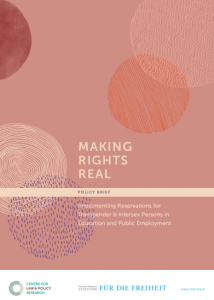The 
Reservations for transgender and intersex persons in education and employment are crucial for their social and economic inclusion. This is because only 46% of transgender persons in India are literate. 94% are either unemployed or employed in the informal sector. CLPR’s policy brief provides a comprehensive and functional strategy for implementing reservations for transgender and intersex persons in educational institutions and public employment.
BENEFICIARIES OF THE RESERVATION
The brief identifies that in the Indian context, there is no separate definition for ‘intersex’. Intersex persons are included within the term ‘transgender’. Many cases of transgender reservation are in fact of intersex persons in India. It settled on the following definitions for both transgender and intersex persons:
Transgender Person: Transgender persons are persons whose gender identity or gender expression does not conform to their biological sex. This includes persons who intend to or have undergone Sex Reassignment Surgery (SRS). It also includes transsexual persons, cross-dressers and all other identities.
Intersex Person: An intersex person is born with sexual anatomy, reproductive organs, and/or chromosome patterns that do not fit the typical definition of male or female. This may be apparent at birth or become so later in life. An intersex person may identify as male or female or as neither.
While NALSA guaranteed the right to self-identification of one’s gender as male, female or transgender, it did not lay down any method or self-identification protocol. Hence, medical procedures or hormone therapy should not be a pre-condition for legal recognition on identity documents.
Gender recognition procedures should be quick, accessible, transparent and based on self-determination. If a person needs to change how their gender is recorded, their expression of intent should be enough such a change. Subsequently, the process of obtaining identity cards by transgender and intersex persons must be based only on self-identification.
HOW SHOULD THE STATE IMPLEMENT RESERVATION FOR TRANSGENDER AND INTERSEX PERSONS?
The Policy Brief outlines the categorical basis for reservation and the extent of reservation that must be provided.
TRANSGENDER AND INTERSEX PERSONS’ RESERVATIONS UNDER THE ‘TRANSGENDER’ CATEGORY
It states that the reservations extended to women under Article 15(3) should be extended to transgender and intersex persons. Women and persons with disability receive special or horizontal reservations. Such reservations are provided under Articles 15(3) and 16(1), as a horizontal category for the purpose of reservation. Governments should provide compartmentalised horizontal reservations. This would mean that the selection of transgender and intersex candidates should happen on the basis of merit lists. The authority will prepare lists under the category (SC, ST, OBC, OC) they belong to. For example, if a transgender candidate belongs to the SC category, the authority will select them based on the merit lists in the SC category. Thus, ensuring fair competition to all the candidates.
TRANSGENDER AND INTERSEX PERSONS’ RESERVATIONS UNDER THE ‘WOMAN’ CATEGORY
In Nangai v. Superintendent of Police, the Madras High Court held that: ‘treating the petitioner as not a female on the basis of medical declaration that she is a transsexual and forcing her to accept the said sexual identity will surely be an infringement of the rights of the petitioner guaranteed under Articles 14, 15, 16, 19(1)(a) and 21 of the Constitution of India.…….the petitioner was born as a female, recognised by the society as a female, she choose to identify herself as a female for all purposes. Therefore, I hold that she is a female in the legal parlance and thus, she is eligible for appointment as a Woman Police Constable.”
So, transgender persons who wish to identify as ‘women’ should be permitted avail reservation as under the distinct cateogory of ‘woman’. Especially if they do not wish to avail reservation relying on their transgender identity card.
EXTENT OF RESERVATIONS FOR TRANSGENDER AND INTERSEX PERSONS
The policy brief does not propose a definite extent of the reservation which should be provided. Such a proposal must rest on an empirical assessment of the size of the transgender and intersex population in India. If the ‘transgender’ category is provided horizontal reservation, it will not breach the 50% limit which the Supreme Court set for vertical reservations.
CONCLUSION AND RECOMMENDATIONS
The Union should enact central legislation to respond to the issues discussed in the policy brief. The legislation should include the following aspects:
- The statute should clearly define “transgender and intersex persons” building on the right to self-identification of gender identity. It should also lay down a process for the self-identification of gender identity. This process should not involed any medical diagnosis or mental health assessment which would encroach on their dignity and privacy.
- The statute should provide for the establishment of Committees or State Transgender Welfare Boards. Suhc bodies would issue identification cards based on the principle of self-identification. At least 50% of the members of these bodies should be transgender and intersex persons. Further, these bodies must conduct periodic surveys and studies on the state of affairs of the transgender community. And the extent to which reservation and supporting policies are improving their conditions.
- The Statute should specifically provide for horizontal reservations for transgender and intersex persons in education and public employment. The reservations can come under either the ‘transgender/gender identity’ or ‘woman’ categories. A horizontal compartmentalised approach takes into account the intersectional experience of discrimination on the basis of gender and caste. Moreover, reservation under the ‘transgender/gender identity’ category should be accessible solely on the possession of an identity card.
- The Statute must specify the extent of reservation based on a time-bound national survey conducted by the Central Government. Such a survey must estimate the number of transgender persons and their current living and social conditions. So, it will be a comprehensive basis for legal intervention in the near future.
